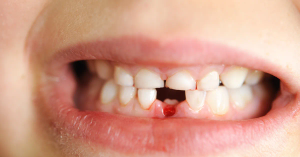Speech development in children is a complex process influenced by neurological, environmental, and physiological factors. While stuttering primarily stems from neurological and genetic causes, the role of oral health in speech clarity cannot be overlooked. This article explores the connection between oral health and stuttering, highlighting the importance of dental care in speech development.
The Connection Between Oral Health and Speech
Oral structures like the teeth, tongue, palate, and jaw play a critical role in speech production. Misalignments or dental issues can affect how sounds are articulated, potentially influencing speech fluency.
Key Oral Health Factors Affecting Speech
1. Malocclusion (Misaligned Teeth):
• Issues like overbite, underbite, or crowding can obstruct tongue movement, making it difficult to form certain sounds.
• Children with malocclusion may overcompensate when speaking, potentially leading to disfluencies.
2. Tongue-Tie (Ankyloglossia):
• A restricted frenulum (the tissue under the tongue) can hinder tongue movement, impacting speech clarity.
• In severe cases, it may contribute to hesitation or repetition in speech.
3. Tooth Loss or Decay:
• Missing or decayed teeth can affect the way air flows during speech, altering pronunciation.
• Common sounds like “s” or “th” may become challenging to articulate.
4. Jaw Development:
• Conditions like Temporomandibular Joint (TMJ) dysfunction or underdeveloped jaws can affect oral coordination and speech patterns.
Does Oral Health Influence Stuttering?
While stuttering is primarily neurological, poor oral health can exacerbate speech difficulties in the following ways:
• Self-Consciousness: Children with dental issues may feel embarrassed about their appearance or speech, increasing anxiety, which can worsen stuttering.
• Articulation Challenges: Physical barriers like tongue mobility restrictions or malocclusion can lead to compensatory speech patterns, potentially affecting fluency.
Promoting Oral Health for Better Speech
Maintaining good oral health is critical for children’s overall well-being and speech clarity.
Tips for Parents
1. Regular Dental Check-Ups:
Early detection of dental issues like malocclusion or tongue-tie can prevent speech-related challenges.
2. Good Oral Hygiene Practices:
Brushing twice daily and flossing can prevent tooth decay and gum disease, ensuring healthy oral structures for speech.
3. Balanced Nutrition:
A diet rich in calcium, phosphorus, and vitamin D supports strong teeth and jaw development.
4. Addressing Dental Issues Early:
Interventions like braces, spacers, or frenectomy (for tongue-tie) can significantly improve speech mechanics.
Role of Speech and Dental Professionals
Collaboration between speech therapists and pediatric dentists is vital for addressing complex speech issues in children:
• Speech Therapists: Focus on techniques to improve fluency and articulation, even in the presence of oral health challenges.
• Pediatric Dentists: Address structural issues that might hinder effective speech production.
Key Takeaways
• Healthy oral structures are essential for clear speech and articulation.
• While oral health issues don’t directly cause stuttering, they can contribute to speech difficulties.
• Early dental care and professional interventions can support speech development and confidence in children.
By maintaining healthy teeth and oral structures, parents can help pave the way for their child’s confident speech journey, free from barriers that could impact fluency.








